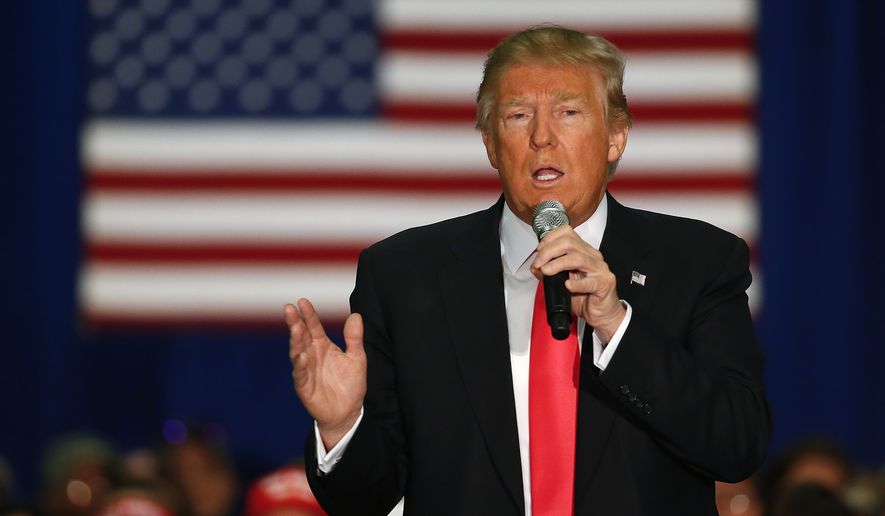Donald Trump’s presidential campaign blamed his loss in Wisconsin’s primary Tuesday on “illegal” tactics by chief rival Sen. Ted Cruz, attempting to dismiss his disappointing finish as the result of dirty tricks but instead earning accusations that he’s “whining.”
Mr. Trump and his advisers said Mr. Cruz illegally colluded with a political action committee and is a “Trojan horse” for the GOP establishment — a comment the Texas senator waved aside, saying it was more proof that Mr. Trump is struggling and voters are tiring of his brash approach to politics.
“Donald has no solutions to the problems we’re facing,” Mr. Cruz told reporters Wednesday. “He likes to yell and scream and insult and curse, and his statement last night was consistent with that.”
His post-Wisconsin accusations are just the latest instance of Mr. Trump excusing a poor performance by saying he was done in by dirty deeds. After losing the Iowa caucuses, Mr. Trump accused the Cruz campaign of frightening voters and spreading false rumors that fellow candidate Ben Carson was quitting the race.
The combative approach to a loss is yet another departure from standard political practice, said Rick Hasen, a political scientist at the University of California, Irvine School of Law.
“I think Trump is a terrible whiner,” Mr. Hasen said. “He’s always making excuses when he loses as opposed to being a gracious loser, which I think we’ve seen [from] Cruz and Clinton and Sanders and Rubio. Usually they [say] ’I congratulate my opponent on a hard-fought race’ — that’s a more typical thing that you hear. Not ’they cheated, it’s not fair, there are too many people running against me’ or anything like that,” Mr. Hasen said.
The less-than-gracious approach to losing has so far worked for Mr. Trump, but he might have reached its limit, said Darrell West, vice president and director of Governance Studies at The Brookings Institution.
“He is entering a new phase of the campaign, and so there’s a question as to whether all the whining is catching up with him,” Mr. West said.
While still leading in the overall delegate race and in national polling, Mr. Trump has stumbled in recent weeks, suffering losses in contests in Utah and now Wisconsin, and watching as unfriendly delegates were chosen in Louisiana, North Dakota and Colorado.
At the same time, his campaign manager was charged with simple battery after an altercation with a reporter, and the candidate himself seemed to buck conservative orthodoxy on abortion and the role of the federal government in education and health care.
After Mr. Cruz won Wisconsin with 48 percent of the vote to Mr. Trump’s 35 percent, the Trump campaign lashed out in a statement late Tuesday saying he was “a Trojan horse” being used by the GOP establishment to stop the Trump train.
The Trump campaign also accused Mr. Cruz of collusion with a political action committee — a move that, if true, would be illegal.
Barry Bennett, a senior adviser to the Trump campaign, elaborated on Wednesday, saying that the violation stemmed from Mr. Cruz attending an event hosted by a pro-Cruz super PAC.
“They set up an event, paid for by the super PAC, and he comes and gives a speech. It’s total coordination,” Mr. Bennett said on MSNBC. “They then film it and turn it into commercials. I mean, it’s too cute by half.”
The Trusted Leadership PAC, however, said it followed all laws, and said Mr. Trump’s accusations were baseless.
“It is unbecoming for a presidential candidate and his surrogates to continue to make ridiculous accusations,” said Chip Roy, executive director of the group.
Mr. Roy’s PAC isn’t the only one to work closely with a candidate this election — though what exactly constitutes “coordination” under Federal Election Commission guidelines is a subject that’s been hotly debated.
The FEC has issued guidance that candidates can attend such super PAC events but only solicit funds of up to $5,000 at them, said Paul S. Ryan, deputy executive director of the Campaign Legal Center, which has filed complaints against some of the candidates.
“They can’t ask for more than five grand,” Mr. Ryan said. “But they are permitted to attend, speak and be featured guests at super PAC fundraising events.”
Mr. Cruz’s campaign does not hide its relationship, listing on his public schedule when he’s attending events sponsored by “Keep the Promise,” a coalition of pro-Cruz super PACs.
Even a candidate getting filmed at such an event might not be enough to cross the line, said Richard Skinner, a money-in-politics policy analyst at the Sunlight Foundation.
“My sense is if it’s just footage of a candidate at an event put on by a super PAC, and it’s an event that’s available to the public and this candidate had no participation in the shooting of the footage, just happened to be there, then I think that it would not be ruled to be coordination,” Mr. Skinner said.
Candidates — or potential candidates — have figured out other workarounds to the law.
Super PACs supporting Ohio Gov. John Kasich, former Florida Gov. Jeb Bush and former Hewlett-Packard CEO Carly Fiorina all shot footage of those candidates for use in broadcast advertising.
The PACS insisted they didn’t cross any lines, and in the case of Mr. Kasich and Mrs. Fiorina, the groups said they shot their footage before the two announced their candidacies.
But analysts have said such boundary pushing isn’t necessarily in the spirit of what should constitute “coordination.”
Mr. Hasen said, as it stands, there’s significant ground super PACs can cover independent of the campaigns themselves without risking dust-ups with the law.
“So it’d be really kind of a dumb thing to actually coordinate, and the campaigns are smart and have very good lawyers that make sure that they don’t do things that are blatantly illegal,” he said.
• David Sherfinski can be reached at dsherfinski@washingtontimes.com.




Please read our comment policy before commenting.